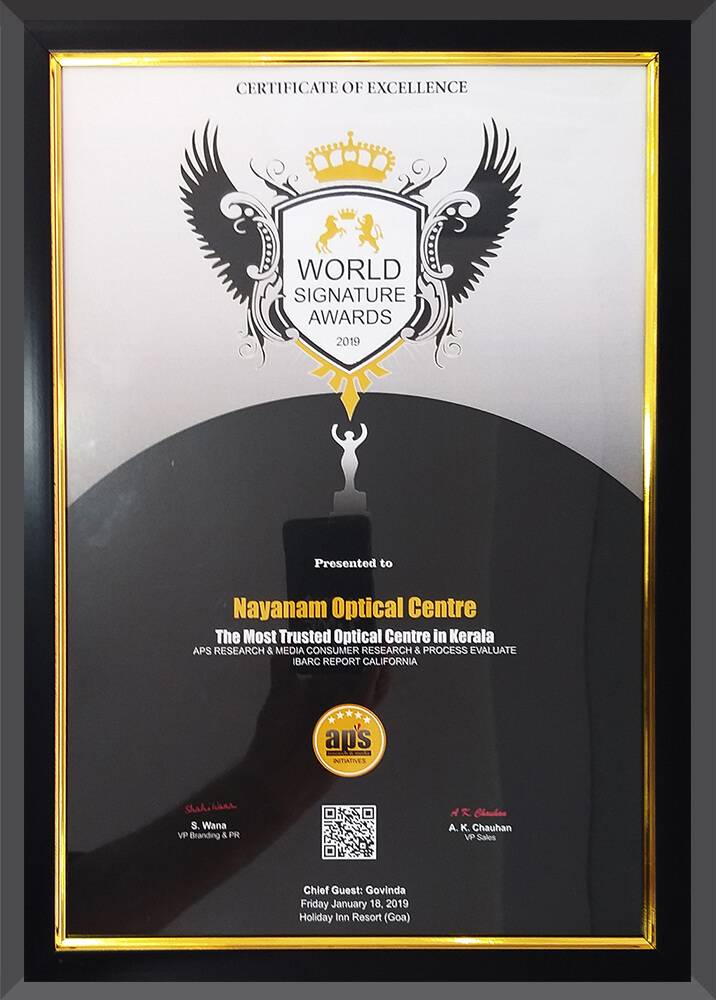Vision Meets Style at Ejones Opticals
Discover the perfect blend of expert eye care and trendsetting eyewear. At Ejones, your vision is our priority — and your style, our passion. Step into a space where clarity meets confidence.
About Us About Us

Frames

Sunglasses

Spectacle Glasses

Contact Lenses

Vision Examination

Lens Care Product

Best Opticals Shop in Kannur | Ejones Opticals
Ejones Opticals showroom is the best opticals store in Kannur, Kerala equipped with expert opticians and beautiful eyewear. We are committed to improving your vision and have achieved ISO 9001:2015 certification for our eye clinic and eyewear retail and wholesale. We offer a wide selection of fashionable eyewear from top brands like Ray-Ban and Oakley, as well as professional eye care services from our team of experts. Visit us in Kannur to experience the best in eyewear and eye care at Ejones Opticals.
1 Year Warranty
Your purchase is protected with a full year of coverage for any manufacturing defects.
Retail & Wholesale Services
Serving both individual customers and businesses with equal care and attention.
Certified Eye Specialists
Get expert care from experienced optometrists and certified professionals.
30 Days Free Return
Changed your mind? Return it within 30 days — no questions asked, no extra fees.

Premium Eyeglasses Shop in Kerala
We believe everyone deserves access to affordable and high-quality eyewear. This belief led to Ejones Opticals one of the top-notch eye care in Kerala. At our optical shop, we offer not just eyewear but eye solution with modern technology. We care genuinely, that's giving you accurate eye care and also provides the latest variety of eyewear collections.
Ejones opticals is a complete eye clinic for an eye checkup, eyewear, sunglasses, and contact lenses. The trusted optical shop in Kerala is the most recognizable name in Payyanur for the best and latest eyewear brands like Ray-Ban, Vogue, Gucci, Dior, Prada, etc. to name a few - just search "optical shop near me" or "optical store near me" or "opticals near me" or "optician near me" in Kannur and you will find us ready to service your eyecare needs.

Why we are best optical shop In Kerala?
Ejones Opticals is one of the oldest optical shop in Kerala which began its operations from 1978, and since won millions of hearts.
Our mission and passion are to provide our customers with a custom-curated selection of handmade eyewear brands, as well as individual fittings and fashion eyewear consultations.
We employs fully qualified and experienced optometrist, committed to excellent eye care and professional advice to your exact requirement. Ejones optical's is home to world's top eye wear brands like Rayban, Mau Jim, Oakley, Tommy Hilfiger, Armani, Hugo Boss and etc.

Reap the benefits of cuttinge edge technology
Ejones Opticals is the best eye wear shop in Kerala, offering a wide range of high-quality eyewear at a reasonable price. Our eye clinic is fully equipped with the latest hi-tech equipment, including a phoropter and other advanced eye care technologies. We are the only optical shop in North Kerala to offer phoropter technology, which allows for contactless consultations and the most accurate eye test results.
In addition to providing excellent eye care, Ejones Opticals is also a fashion-forward shop, with a wide selection of contemporary eyewear styles. Our use of innovative equipment like the Essilor auto edger, imported from France, ensures that our glasses are of the highest quality and perfectly fitted for our customers. With our commitment to both eye care and fashion, it's no surprise that Ejones Opticals has become the number one optical shop in Kerala."
Featured Items
It is a long established fact that a reader will be distracted by the readable content of a page.
Answers to Frequently Asked Questions
Find quick answers to the most common questions about our products, services, shipping, returns, and more. We're here to make your experience smooth and simple.
Do you offer prescription lenses?
Yes, we provide high-quality prescription lenses tailored to your vision needs. Our opticians ensure perfect accuracy and comfort.
Can I return or exchange my eyewear?
Absolutely! We offer a 30-day free return policy if you're not satisfied with your purchase.
Is there a warranty on your products?
Yes, all our eyewear comes with a 1-year warranty against manufacturing defects.
Do you offer eye testing at your store?
Yes, our in-store eye clinic is ISO 9001:2015 certified and staffed by experienced eye care professionals.

We have won several awards
Ejones opticals has won several awards in the past, which includes highly coveted APS Research's World Signature Awards. We were hailed as the most trusted optical shop in Kerala. Ejones opticals' commitment to quality made was celebrated with these awards.








